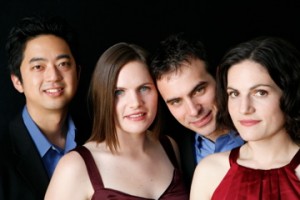CHAMBER MUSIC SOCIETY OF SALT LAKE CITY, Jupiter String Quartet, with violist James Dunham, Libby Gardner Concert Hall, Dec. 4
It’s always a treat to have the Jupiter String Quartet in town — it’s been nearly four years since the group last played in Salt Lake City. In the intervening time, the quartet has been honing and polishing its craft and garnering accolades wherever they appear. The four (sisters Megan and Liz Freivogel, playing second violin and viola, respectively, first violinist Nelson Lee and cellist Daniel McDonough) are masterful interpreters who get to the core of the works in their repertoire, whether it’s from the 18th or 20th centuries. They bring feeling and emotional involvement to their playing, there is a wonderful chemistry among them and they’re just plain fun to watch.
For their concert Thursday in Libby Gardner Concert Hall, they brought along violist and long time collaborator James Dunham for two works — Mozart’s Quintet in G minor, K. 516, and Brahms’ Quintet No. 2 in G major, op. 111. Dunham fit right in and was a wonderfully supportive and integral addition to the quartet.
They opened the concert with the Mozart. The G minor Quintet, along with the C major Quintet, K. 515, are the pinnacles of Mozart’s chamber music for strings. They are large scale works and he treats the structure and thematic material symphonically.
The G minor is an overwhelmingly dark and somber work, with an Adagio that is filled with sorrow. The five players captured the pathos of the work with a sensitively executed treatment that was imbued with a large palette of expressions.
The finale, after a heart wrenching Adagio introduction, is the only optimistic movement in the quintet. As such it offers a striking, and much needed, contrast to the rest of the work. The players reveled in the unbridled joyfulness of the music and delivered a triumphant account of this glorious movement.
Even though it sports a high opus number, Brahms’ G major Quintet is not what one would expect from one of his late works. Instead of the introverted, moody tone that characterizes most of his last compositions this quintet is exuberant and almost youthful in nature.
The five delighted in the unbridled optimism of the work. They underscored its sunny disposition with a vibrant and spirited account that was beautifully crafted and lyrical. It was an engaging and radiant reading that captured the effusive expressiveness of the work.
In between these two, the Jupiter played Bartók’s powerful Quartet No. 5. They gave a fabulous account, diving headlong into the score to distill the essence of the music. It was an intense and passionate perusal that captured the ferocity of the outer movements, the rhythmic vitality of the third movement scherzo and the evocative otherworldliness of the two slow movements. This was an exceptional performance of what is arguably Bartók’s best quartet.


